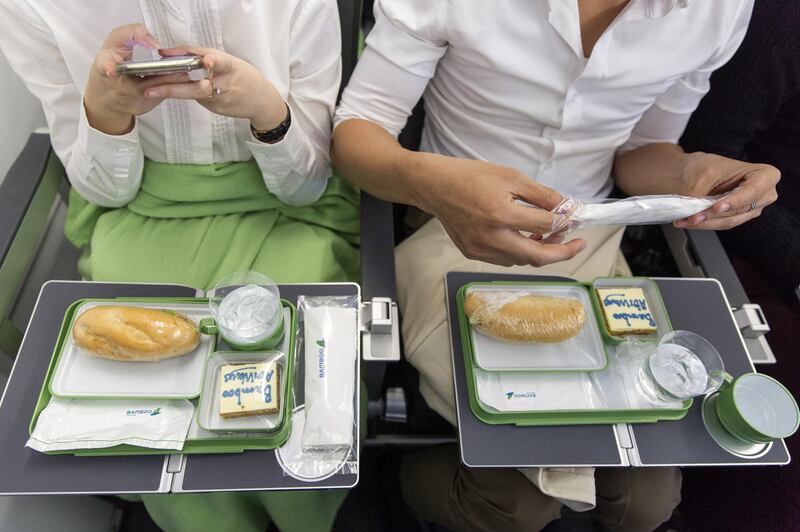A hard Brexit could bring queues at airports and put a brake on new routes but airline passengers should at least be able to enjoy an in-flight meal.
With concerns growing that a no-deal split will snarl up traffic at UK ports, stalling the flow of goods, the world’s biggest caterer to the aviation industry has started to stockpile entrees, snacks and even plastic cutlery.
Gate Gourmet, which serves 20 airlines at 10 UK airports, is accumulating enough pizza, ice cream and roast duck (for business class) to see passengers through about 10 days of disruption. Chilled items are being held at a warehouse in Peterborough, England, while mountains of snack boxes, peanuts and toilet rolls are piling up at a room-temperature facility in London.
“Companies could be in difficulty if they haven’t prepared themselves and ensured a continuity of supply,” said Stephen Corr, the Zurich company’s managing director for western Europe. “We’ve been gradually increasing inventory levels of products from the European Union to ensure that any initial disruption at the UK border can be covered.”
In-flight meals join car parts, plane wings, newsprint and cancer drugs among items building up at dozens of specialist warehouses. Gate Gourmet, part of the former Swissair catering arm Gategroup that is now controlled by China’s HNA, produces most of its meals in Germany and Spain, with airlines in the UK supplied by lorry.
That means using the Calais-Dover sea crossing that is expected to become a pinch-point following the introduction of time-consuming customs checks if Britain exits the EU without a deal. Before being sent to the airport for reheating aboard the plane, the cooked food is stored in Peterborough.
The site, run by a Chiltern Cold Storage, is now 98 per cent full with everything from frozen meat for restaurants to vegan meals and dog food as suppliers the length and breadth of Britain call on its services, according to operations director Tom Lewis.
More and more companies are triggering contingency plans with the Brexit deadline less than 75 days away and Prime Minister Theresa May this week failing to get a deal brokered with the EU past Parliament.
_______________
Read more:
Theresa May plans next move in Brexit fight as chances rise of delay
Brexit worries put Asian companies under stress
_______________
Businesses from engine-maker Rolls-Royce to brewer Heineken have outlined plans to hoard in case a tumultuous Brexit chokes just-in-time supply chains and creates backlogs at ports.
Rolls-Royce confirmed in December for the first time that it is hoarding parts and Airbus, which makes aircraft wings in Britain and announced its own plans in July. Drug makers Astrazeneca, Pfizer and Novartis are also boosting supplies. Drug makers are adding to inventories of key medicines such as insulin.
Associated British Foods, whose products include some of the country’s most popular tea, bread and sugar, is buying ingredients, packaging and machinery ahead of time to mitigate the risk of any disruption.
“Planning for anything other than no deal doesn’t make sense, because there isn’t any evidence that there will be one,” said Brian Palmer, chief executive of Tharsus, a maker of robotics and hi-tech machines based in north-east England. “It’s not an optimal way to run a manufacturing organisation.”
Tharsus is stocking up on the motors and pumps it needs to keep producing for its clients around the world. It’s also increasing output to ensure it can deliver April’s demand in March, the month the UK is due to leave the EU.
For now, it’s a boon for warehouses. At Swiss freight company CEVA Logistics, executive director Leigh Pomlett is hiring extra workers to staff its storage units, because “the UK is filling up with a lot of Brexit stock”.
Warehousing companies that typically operate at about 75 per cent to 85 per cent capacity in January are now above 90 per cent due to the Brexit effect, said Peter Ward, chief executive of the UK Warehousing Association.
“It’s been aligned with the realisation that a day-one no-deal scenario was looking more probable,” he said.






